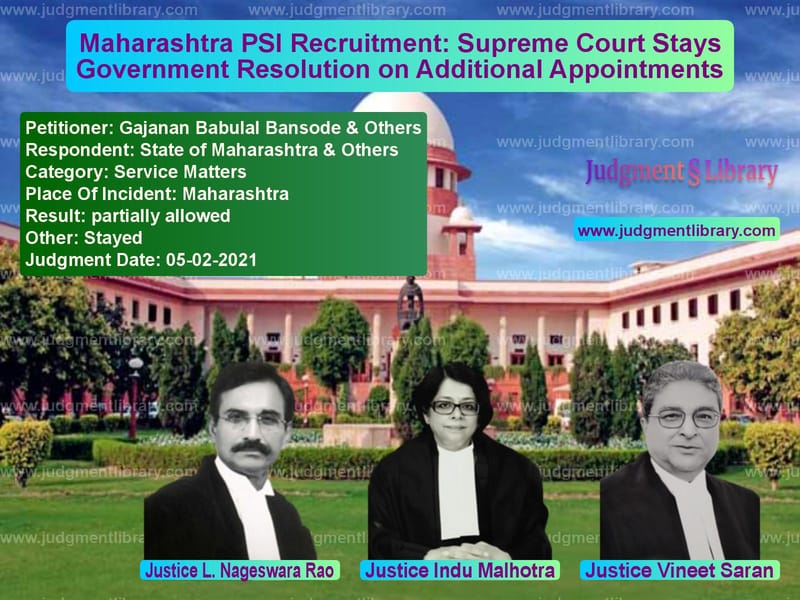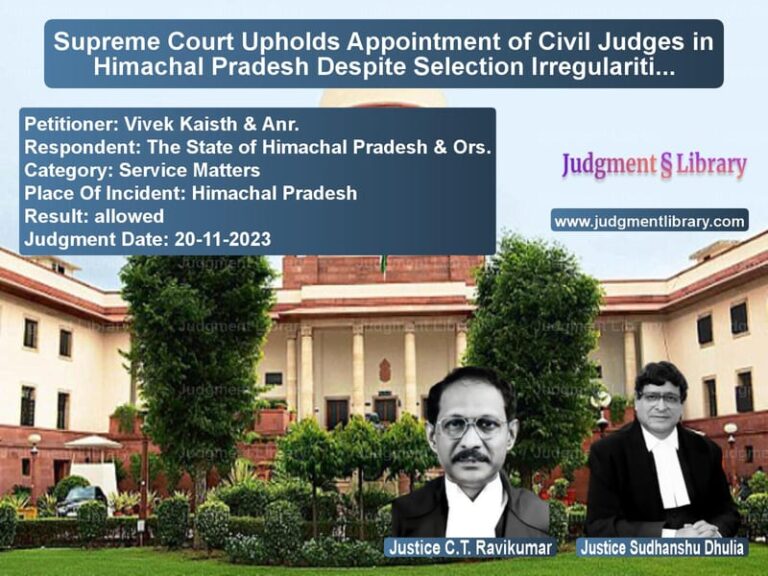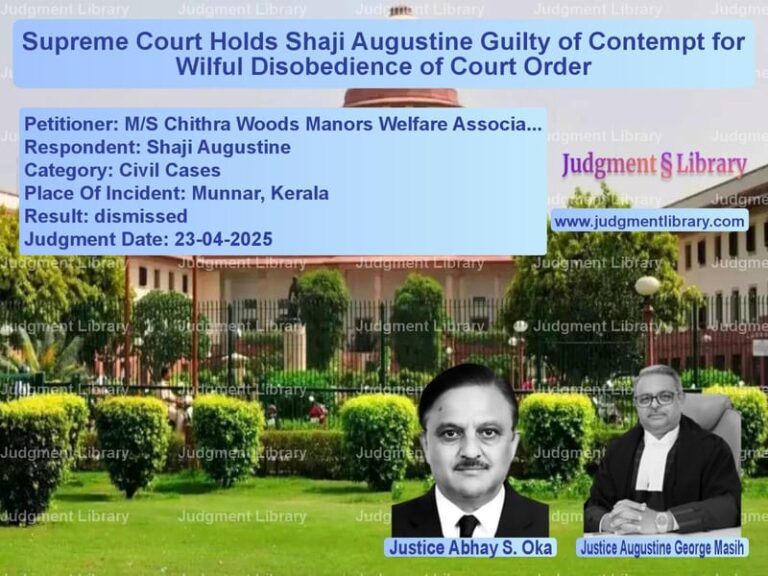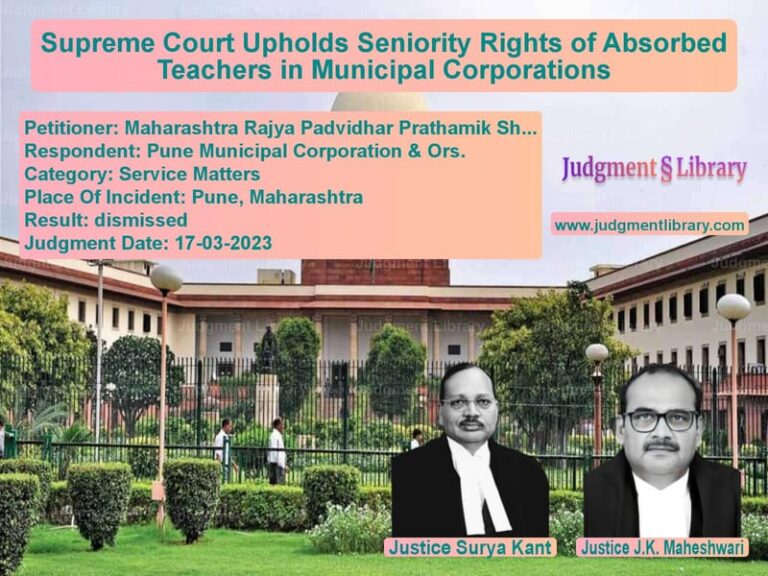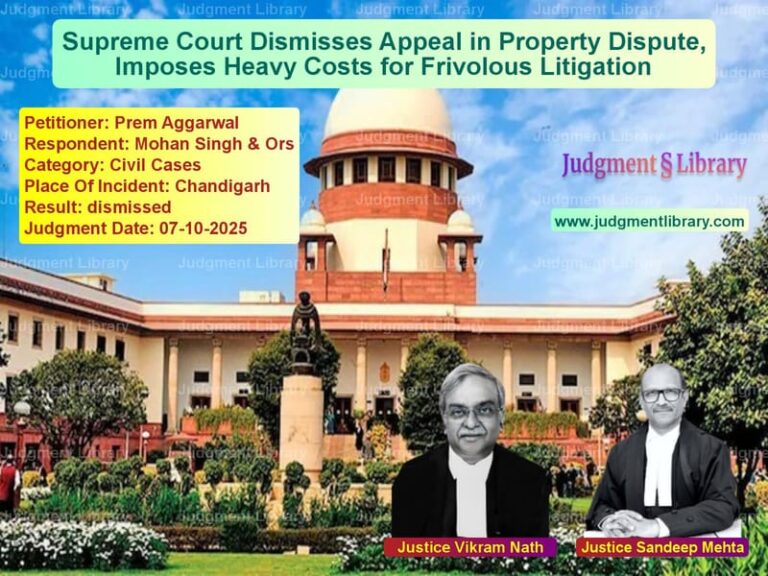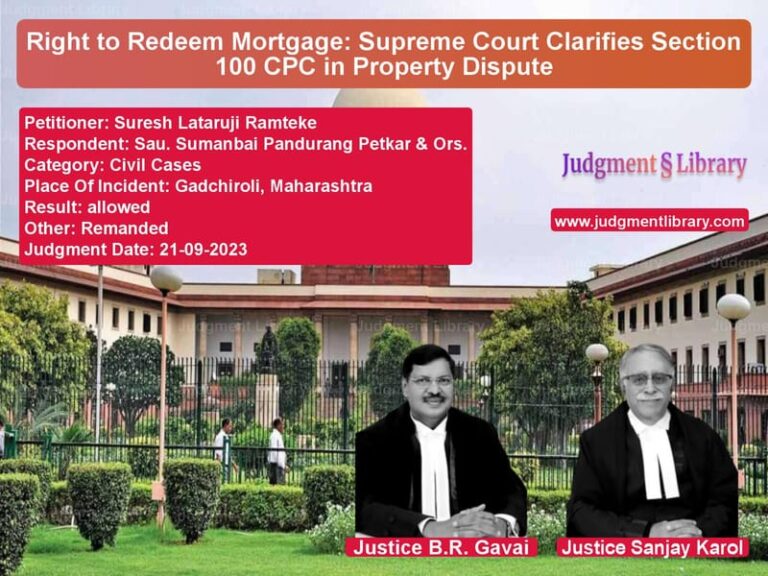Maharashtra PSI Recruitment: Supreme Court Stays Government Resolution on Additional Appointments
The Supreme Court of India recently delivered a judgment in the case of Gajanan Babulal Bansode & Others vs. State of Maharashtra & Others, addressing concerns over the Maharashtra government’s decision to accommodate 636 additional candidates in the Limited Departmental Competitive Examination (LDCE) 2016 for Police Sub-Inspector (PSI) recruitment. The Court stayed the government resolution, ensuring fairness in recruitment and preventing undue advantage to certain candidates.
Background of the Case
The case originated from the Maharashtra government’s requisition to the Maharashtra Public Service Commission (MPSC) to conduct LDCE 2016 for PSI selection. The recruitment was governed by the Police Sub-Inspector (Recruitment) Rules, 1995, which provided three modes of appointment:
- 25% through promotion from existing personnel.
- 25% through Limited Departmental Competitive Examination (LDCE).
- 50% through nomination via direct recruitment.
The MPSC initially recommended 828 candidates (642 from the open category and 186 from reserved categories) based on the final result published on December 12, 2017. However, the Maharashtra government later issued a Government Resolution (G.R.) dated April 22, 2019, accommodating 636 additional candidates who had secured more than 230 marks.
The decision led to multiple legal challenges, including:
- Original Applications filed by in-service candidates before the Maharashtra Administrative Tribunal (MAT).
- A writ petition before the Bombay High Court challenging the additional recruitment.
Petitioner’s (Gajanan Babulal Bansode & Others) Arguments
The petitioners, consisting of in-service police personnel, raised the following concerns:
- The additional recruitment violated the recruitment ratio of 25:25:50 prescribed in the rules, adversely affecting promotion opportunities.
- The decision was taken without consulting the MPSC, as required under Article 320 of the Constitution of India.
- The move benefited candidates who either failed or were ineligible due to age, experience, or educational qualifications.
- The Bombay High Court’s order allowing the additional candidates to undergo training undermined the pending legal challenge.
Respondent’s (State of Maharashtra) Arguments
The Maharashtra government defended its decision, arguing:
- The G.R. was issued under Rule 5 of the 1995 Recruitment Rules, which allows deviation from the standard recruitment process in exceptional circumstances.
- The additional appointments were necessary to address a shortage of PSI officers in the state.
- The Bombay High Court’s decision to allow training was in the best interest of law enforcement.
Supreme Court’s Observations
The Supreme Court bench, comprising Justices L. Nageswara Rao, Indu Malhotra, and Vineet Saran, made the following key observations:
- The Maharashtra government acted unilaterally without seeking prior consultation from MPSC, violating constitutional provisions.
- The recruitment of more candidates than initially notified was impermissible and violated Articles 14 and 16 of the Constitution.
- The appointment of 636 additional candidates distorted the recruitment ratio, negatively impacting promotion prospects for existing personnel.
- “The government must establish whether extraordinary circumstances warranted the use of Rule 5 to override standard recruitment rules.”
The Court emphasized:
“A block recruitment of 636 additional candidates without prior approval of the Commission would have an adverse impact on service conditions and must be carefully reviewed.”
Final Judgment
The Supreme Court ruled:
- The Government Resolution dated April 22, 2019 is stayed until final adjudication.
- The Maharashtra Administrative Tribunal (MAT) is directed to decide the pending cases within six months.
- The state must issue notices to the additional candidates to ensure fair hearings.
- The recruitment process must adhere strictly to the Police Sub-Inspector (Recruitment) Rules, 1995.
Impact of the Judgment
This ruling has significant implications for police recruitment in Maharashtra:
- Strengthening Recruitment Rules: The decision ensures strict adherence to prescribed selection ratios, preventing arbitrary deviations.
- Reinforcing Consultation with MPSC: The judgment upholds constitutional provisions requiring consultation with the Public Service Commission.
- Fair Promotion Opportunities: The ruling safeguards in-service candidates from unfair dilution of promotion chances.
- Legal Precedent for Future Recruitments: The case sets a benchmark for handling similar disputes in police and government service recruitments.
Conclusion
The Supreme Court’s ruling in Gajanan Babulal Bansode & Others vs. State of Maharashtra & Others underscores the importance of following recruitment norms in public service appointments. By staying the government’s attempt to add 636 candidates outside the notified vacancies, the Court has reinforced the constitutional principle of fair and transparent recruitment.
This judgment ensures that recruitment policies remain within the boundaries of law and that government authorities cannot unilaterally alter prescribed selection procedures without justifiable reasons. The ruling is a significant step toward maintaining fair employment practices in law enforcement and public administration.
Petitioner Name: Gajanan Babulal Bansode & Others.Respondent Name: State of Maharashtra & Others.Judgment By: Justice L. Nageswara Rao, Justice Indu Malhotra, Justice Vineet Saran.Place Of Incident: Maharashtra.Judgment Date: 05-02-2021.
Don’t miss out on the full details! Download the complete judgment in PDF format below and gain valuable insights instantly!
Download Judgment: gajanan-babulal-bans-vs-state-of-maharashtra-supreme-court-of-india-judgment-dated-05-02-2021.pdf
Directly Download Judgment: Directly download this Judgment
See all petitions in Recruitment Policies
See all petitions in Promotion Cases
See all petitions in Public Sector Employees
See all petitions in Judgment by L. Nageswara Rao
See all petitions in Judgment by Indu Malhotra
See all petitions in Judgment by Vineet Saran
See all petitions in partially allowed
See all petitions in Stayed
See all petitions in supreme court of India judgments February 2021
See all petitions in 2021 judgments
See all posts in Service Matters Category
See all allowed petitions in Service Matters Category
See all Dismissed petitions in Service Matters Category
See all partially allowed petitions in Service Matters Category

